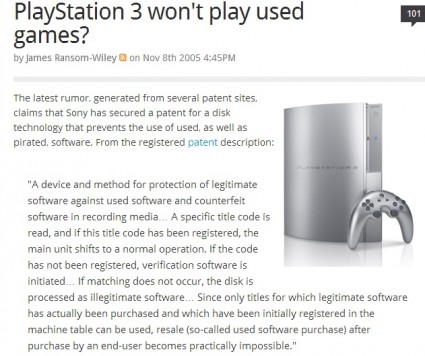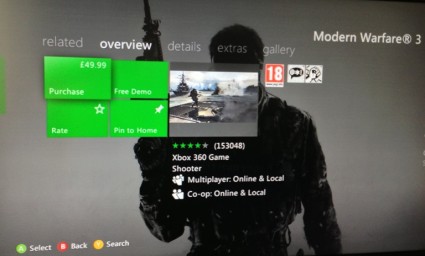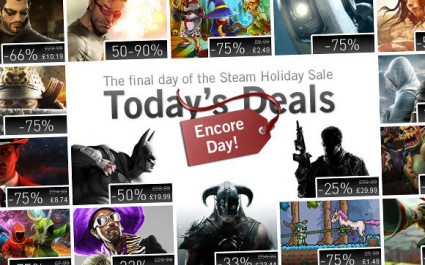Editorials
Second-Hand Games Market: What’s All The Fuss About?
January 7, 2013, Author: Neil Hughes
The last few days has seen gamers at war with each other as both the Microsoft and Sony fanboys battled it out over the “Sony Patent Will Block Second-Hand Games” headlines that spread like wildfire across the internet. Despite Sony taking all the criticism and outrage, gaming website Kotaku were quick to point out that Microsoft could also be using similar technology to stop the use of used games on their shiny new console.
Lets take a step back from the madness for a few moments and remember how the internet often gets itself all worked up with knee-jerk reactions to rumours and leaks, especially considering that both Microsoft and Sony secure hundreds of patents that are never even used. That doesn’t stop everyone wanting that big story that will direct traffic to their website, though.
Every website in the world wants to be the first to have the next Apple, Android, Microsoft, or Android release rather than just re-hashing yet another press release, but if you are still not convinced, lets take a trip down memory lane to the year 2005. Can you guess what the headlines were regarding the Sony Playstation 3 release?

Déjà vu as history repeats itself…
As soon as a story breaks we all get outraged, websites get lots of traffic, then we all calm down again as we find out there actually was never any “official announcement” at all. So maybe we could all learn from this lesson before we feed the trolls in the coming few months, during the massive pissing contest of which console will be better (which will ultimately end up in a childlike “my dad’s better than your dad” kind of argument).
If Sony or Microsoft had any sense, which I’m sure they have, they would steer clear of announcing that they are going to block the use of second-hand games. It’s wasted energy considering that the physical forms of entertainment are dying fast. Sure, we are not ready to embrace this fully at the moment. Make no mistake, though; within two years the idea of holding a physical copy of anything will seem a little archaic.
If the people themselves decide that they no longer want to clutter their home with shelves filled with physical copies of CDs, DVDs, books and games, then everyone does what Sony wants to anyway and as it’s their idea, nobody looks like the bad guy. In fact, as shops everywhere such as HMV fade into the history books, the average punter becomes the bad guy, causing thousands of jobs to disappear. This kind of master plan is nothing short of genius, even for a James Bond villain.
So as this vision of a future becomes a reality, everyone is happy right? Well, not exactly. Sure, when everything becomes ‘just a file’ they might be easier and cheaper to produce, but as customers, we no longer want to pay the RRP that has been presented to us.
For example, a quick look on Microsoft’s Games on Demand Service reveals the following games with an offensive, inflated price tag.
- Modern Warfare 3: £49.99
- Borderlands 2: £49.99
- Call of Duty Black Ops £49.99

£49.99 Games on Demand rip-off
We all know that we could buy those exact games brand new for under £20, and if they suddenly thought that they could charge this price for all games in the future, they would be out of business quicker than you would think.
Gaming is quite literally an expensive game these days, especially in the current economical climate. Not many people can avoid to purchase more than five full-price games a year, but with a mixture of renting and trading in titles, we can all get to play the games that we want.
A future of where all games are download-only at £49.99 would never work. If I can pickup a copy of Need for Speed: Most Wanted for only 69p on an iPad over Christmas, why the hell would I pay £49.99 for it on a console? It’s just not going to happen.
We simply no longer want to pay the inflated prices for anything any more, and this is something the big companies don’t like. With Netflix and Spotify I can listen to as much music as I want and watch as many TV boxsets and movies that I can for around £15 a month. So why would I want to spend a fortune owning anything else, or on an expensive Sky/cable package?
Looking at the growing methods of how we access entertainment, it is clear to see that the current gaming model is outdated and needs to change to keep up with what people expect and how they access their entertainment of choice.

Steam leading the way. Microsoft and Sony must catch up.
For this reason, it would make sense for gaming to move into a business model similar to that of Steam, or maybe big budget games on release will be treated as a “loss leader” only to up-sell their customers on DLC a few weeks later. Maybe we will see more free-to-play titles, where once again gamers can be upsold items.
Whatever your thoughts on the subject, arguments surrounding the second-hand used games market will quickly become irrelevant and the future will not benefit the companies as much as you think. Competition from PCs and tablets are a good thing, and if the console is going to survive then it will have to evolve or die. Expect that box in the corner of your room to be a whole lot more than just a games console in the coming months; although, many would argue they have become entertainment hubs already.
We are entering a brave new world and the only thing in life that is constant is change. I predict that in two years time, we might look back on this day where everyone is worrying about second-hand games with more than a little amusement.
Tagged cloud gaming, Download Only, Games on demand, Patent block second-hand games, Sony PS4, Steam, xbox 720


